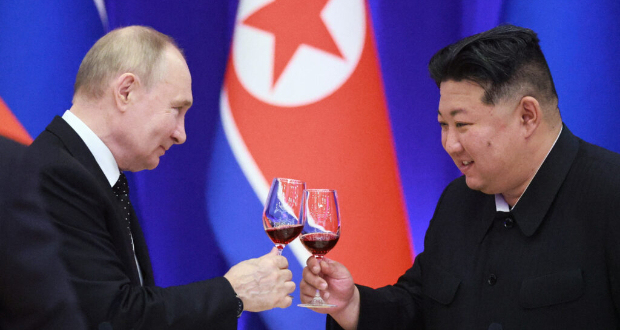It isn’t so much the contents of the new Putin-Kim agreement, which depending on who you listen to is either a mutual defense “alliance” (the North Korean leader’s characterization) or something far less. Putin said Russia “does not exclude” military-technical cooperation and that the agreement provides for “mutual assistance in the event of aggression against one of the parties.”
It isn’t even the ride-through-the-town-together bromance atmospherics of a relationship that not so long ago was frosty over Pyongyang’s nuclear breakout. Putin’s arrival gift to Kim was a Russian limousine because he knew the forty-year-old fellow autocrat likes a snazzy ride. Kim’s gift to Putin was a North Korean portrait of the Russian leader himself, Kim’s assessment of how best to endear himself to Putin.
In fact, the most terrifying point is that Putin’s full-scale invasion of Ukraine in February 2022 should have left the leader isolated and weaker due to Russia’s heavy military losses and the storm of sanctions that followed. It has instead resulted in the closest defense-industrial confederation of autocrats—Russia, China, North Korea, and Iran—perhaps ever.
For details on the whole picture, read today’s front page Wall Street Journal story, based on sourcing from US defense and intelligence officials, on how “Russia’s military cooperation with Iran, North Korea, and China has expanded into the sharing of sensitive technologies that could threaten the [United States] and its allies long after the Ukraine war ends.”
For a narrower but no less revealing view of the consequences of North Korea’s burgeoning relationship with Russia, I turned to the Atlantic Council’s own Markus Garlauskas, the director of our Scowcroft Center for Strategy and Security’s Indo-Pacific Security Initiative.
He previously served in the US government for two decades, including as the national intelligence officer for North Korea. It was a job in which, among other things, he provided direct analytical support to then President Donald Trump for his meetings with Kim in Singapore and Hanoi. Garlauskas knows his stuff.
What worries him isn’t just the military wherewithal that North Korea is providing Russia, which has concerned US intelligence officials so much that that they recently chose to expose sensitive details of what they have unearthed. According to the latest figures released by the US State Department this week, North Korea’s support to Russia in recent months has included more than 11,000 containers of munitions, which range from run-of-the-mill artillery to dozens of ballistic missiles.
Beyond the capabilities North Korea has given Putin to kill more Ukrainians and sustain his illegal war, Putin’s embrace of Pyongyang is “making North Korea a far more challenging problem,” says Garlauskas.
Putin’s support for Kim, he says, is allowing North Korea to more effectively evade United Nations resolutions and sanctions on its weapons capabilities, providing Pyongyang greater access to dual-use technology and badly needed access to hard currency.
Russian support is emboldening Kim, through the robust embrace of a United Nations Security Council member, to be more aggressive against South Korea and the United States. In effect, Putin is protecting the back of one of the world’s premier rogue actors from the consequences of his nuclear saber-rattling and missile launches.




